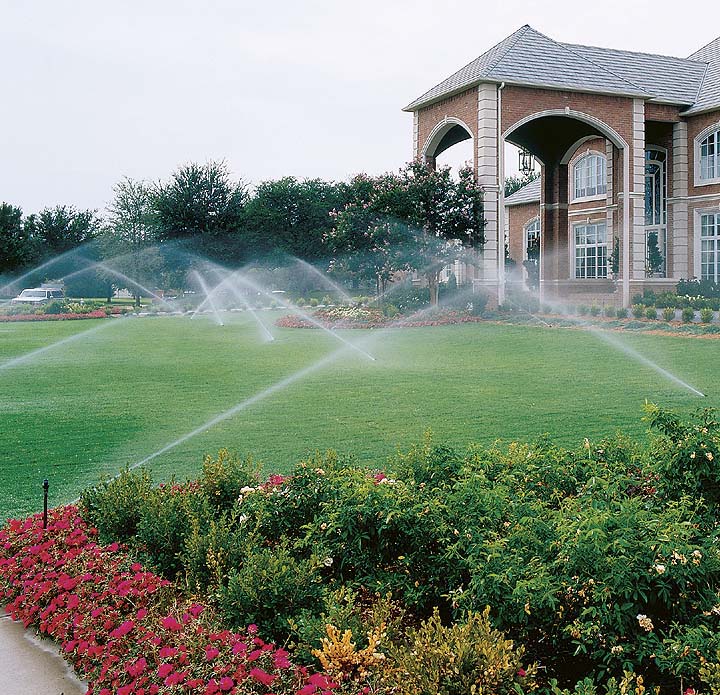How to select an irrigation contractor
A guide for Ontario homeowners, courtesy of the Landscape Ontario Irrigation Group
 The benefits of irrigation are real
The benefits of irrigation are real
A well-designed, properly installed and appropriately maintained irrigation system can be the most efficient way to keep a landscape healthy. The benefits of an automatic irrigation system include:
- Reduced labour for watering
- Convenience
- Full landscape coverage
- Easy control over irrigation timing for early-morning watering
- Added value to your home or business property
- Minimized plant loss during drought
With irrigation systems that deliver exactly the right amount of water at the right time to lawns, plants and trees, you can be assured of environmentally sound and efficient results. The irrigation industry offers reliable options and affordable technology (such as rain sensors) for water conservation and efficient water distribution to protect landscaping investments.
Look for association logos:
Landscape Ontario is one of North America’s most active horticultural trade association. LO member companies pledge to operate under a Code of Ethics. Click here to find a list of member irrigation contractors in your area.
 |
The Irrigation Association (IA) offers certification programs to help homeowners and businesses identify qualified and competent irrigation contractors and designers. One of the IA’s certification programs is the Certified Irrigation Contractor (CIC). Candidates must pass a written, objective, comprehensive exam. Log on to www.irrigation.org for further details. |
When hiring an irrigation contractor, ask whether the contractor has staff that are industry certified.
Irrigation checklist
What to look for when you hire an irrigation contractor
This list identifies the important criteria for hiring an irrigation contractor. If you wish, rate the contractors you are considering, and add up the points to compare.
Proof of Workers Safety and Insurance Board standing
Except for single-person companies, irrigation contractors are required by law to pay WSIB premiums on behalf of their employees in the event of a workplace injury. Hiring companies that are not in compliance makes the project owner, you, liable in case of workplace injuries. Ask to see a Certificate of Clearance. Mandatory.
Proof of liability insurance
All contractors should carry liability insurance to protect themselves and their clients from the expense of any unforeseen workplace incidents that might damage your own or neighbouring properties. Ask to see a Certificate of Insurance; it should state the name and address of the contractor, the fact the company carries a minimum of $1 million commercial general liability, including coverage for bodily injury and property damage, and the effective and expiry dates of the policy as well as the date of issue of the certificate. Mandatory.
Winterization
A contractor should stipulate the winterization procedure and associated fees. Clarify if the first winterization is part of the installation contract.
Contract
A written and signed contract will protect the interests of both the contractor and the homeowner. Contracts should clearly stipulate all details such as payment schedules, work start dates, and the complete scope of the project. Areas of responsibility, such as the provision of underground service locates, permits, etc. should also be stipulated. A good contract will also define procedures for the approval of change orders and costs of extras.
Warranty
The terms and conditions of an irrigation contractor’s warranty should be clearly spelled out in writing and should specify if the workmanship is warranted and for how long and the length of the guarantee on materials.
Human resources
The number of employees, including the number of supervisory personnel should be adequate for the size of the project. Remember, a small company with a single crew may well be sufficient for smaller projects, providing they have adequately scheduled their projects. Client references are the best indicators of scheduling ability.
Employee experience, education and certification
Determine the level of training and experience of key and supervisory personnel. Certification through the CIT and/or CIC programs indicates skilled, committed employees. A credible contractor will be pleased to promote proof of certification.
Equipment resources
The contractor should have adequate equipment resources to complete the job efficiently. It is important to remember that it may be more cost-effective for certain or specialized pieces of equipment to be rented on an as-needed basis.
Scope of expertise (including sub-contractors)
Determine which specific disciplines are required for your project. The company should be skilled in all aspects or have access to and use reputable sub-contractors for those areas in which they have no expertise. These include disciplines such as:
- plumbing and backflow installation
- electrical
- tunneling and boring
Years in business
How many years has the company been in business under the current company name?
Company facilities
Determine if the company has an office, administrative personnel, equipment storage facilities, etc. These facilities may indicate a company’s ability to deal effectively with problems during or after the construction process, return phone calls promptly, etc.
Association membership
An accreditation procedure is part of the Landscape Ontario Horticultural Trades Association membership application process. Landscape Ontario members are required to follow a Code of Ethics and a Code of Conduct. Association membership is a very strong indicator of a company’s commitment to professionalism.
Irrigation and plant health care
What you should know:
A united philosophy on horticultural management has emerged among those who care about our green spaces. It is called Plant Health Care (PHC) or Integrated Pest Management (IPM). This strategy advocates the use of sound horticultural practices to make lawns and plantings as healthy as possible. Healthy, thriving plants are far less prone to insect and disease damage. Accordingly, the need to use pesticides is reduced or even eliminated.
Proper watering is a powerful component of PHC and IPM programs.
Water smarts
Tips for using irrigation water more efficiently
Watering:
- Install rain sensors on sprinkler systems.
- Adjust irrigation timers according to seasonal needs.
- Detect and repair all leaks in irrigation systems.
- Water trees and shrubs, which have deep root systems, longer and less frequently than shallow-rooted plants which require smaller amounts of water more often.
- Set sprinklers to water the lawn or garden only — not the street or sidewalk.
- Water the lawn or garden during the coolest part of the day (early morning is best). Do not water on windy days.
- Use properly treated wastewater for irrigation where available.
- Have system serviced regularly.
Maintaining:
- Use mulch around shrubs and garden plants to reduce evaporation from the soil surface and cut down on weed growth.
- Remove thatch and aerate turf to encourage movement of water to the root zone.
- Raise your lawn mower cutting height — longer grass blades help shade each other, cutting down on evaporation. They also inhibit weed growth.
Ornamental water features:
- Do not install or use ornamental water features unless they recycle the water.
Landscape Ontario membership: A sure sign of pride
Landscape Ontario’s mission is to be the leader in representing, promoting and fostering a favourable environment for the advancement of the horticulture industry in Ontario.
What does this mean for you?
That providing this information is just one of Landscape Ontario’s efforts to ensure that you, the consumer, enjoy good experiences when you deal with member companies. We find the best way to achieve that goal is through competence, integrity and fairness. Our success is tied to your satisfaction with the work our members provide, and our pride is tied to the pride you take in your family’s property.
View a list of LO member irrigation contractors in your area.
How to Select an Irrigation Contractor |







